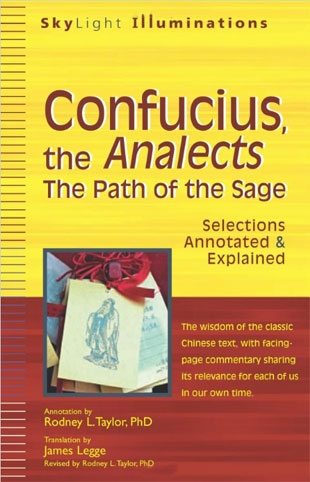Confucius (551-479 BCE) still reigns as one of the most notable figures in the history of human thought. He was a sage whose broad range of interests included philosophy, ethics, education, social criticism, and politics. In our time when corporations are violating the rights of workers and the poor, when government is caught up gridlock and both political parties are pawns of wealthy and powerful lobbyists, and when the gap between the rich and the poor is growing; it is edifying and illuminating to read once again the wise commentary of this ancient sage who believes in the virtues of humility, justice, courtesy, trust, learning, and respect for elders.
Rodney L. Taylor is the foremost American researcher of Confucius as a religious and spiritual figure. He has written the annotations which accompany the text in this volume in the SkyLight Illuminations series. The "path of the sage" or "the Way of Heaven" is grounded in goodness, which defines the proper relation between persons. In the Analects, Confucius says that to practice goodness (jen) is to practice "gravity, generosity, sincerity, earnestness, and kindness." Imagine a society where greed, selfishness, fear, anger, and hatred were replaced by these five virtues.
The book is divided into thematic sections on Confucius' humanity, the Noble Person, filial piety, ritual and music, learning, truthfulness and righteousness, the teaching of goodness, the single thread, tradition, the way of Heaven, and self-knowledge. At one point in the Analects, Confucius says, "There are three things of which the Noble Person stands in awe. He stands in awe of the ordinances of Heaven. He stands in awe of great men. He stands in awe of the words of the sages." Reading this passage and thinking about the contemporary over-use of the "awesome," we've concluded it would be helpful for more people to use the term "awe" as a spiritual one relating to the feeling of high regard for something grand, mysterious, or sublime.
